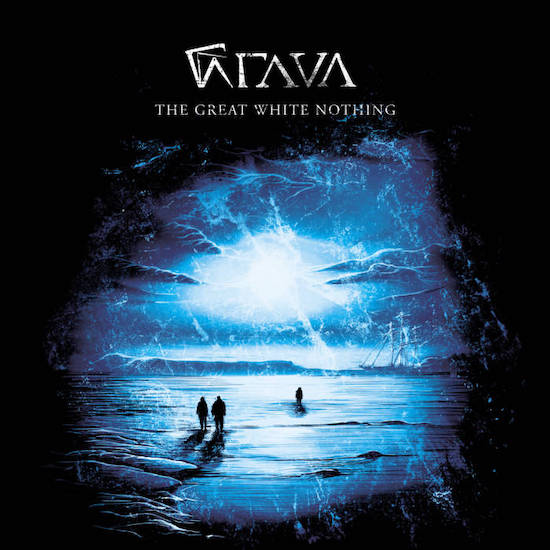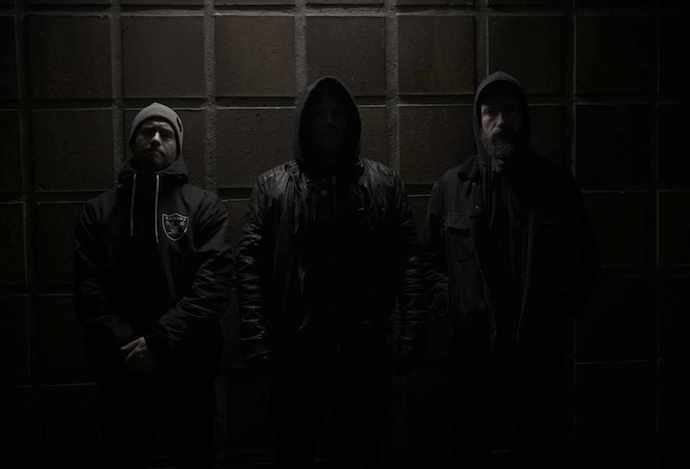
(written by Islander)
The 2022 debut album from the Faroese/Danish sludge/post-metal metal trio Grava was an unusually compelling union of visual and musical art. If you’ve seen the cover of Weight of a God (here) and then listened to any of the songs, you already know how well the image matched the crushing music and the album’s utterly bleak conception.
That cover was conceived with one track principally in mind, a song named “Crusher” about a man condemned to be trampled to death by a work elephant in front of a crowd of onlookers, told from the point of view of the condemned man, who sees the beast as the manifestation of a god — a perception that connects to the album title.
All the songs on Weight of a God portrayed different instances of a human being meeting death, seen through their eyes at the last moment. Grava continue telling such harrowing tales on their follow-up album The Great White Nothing, which we’re about to premiere in full, one week away from its release by a trio of labels.
Once again, the cover art (again created by Johannes Larsen) vividly connects to some of those terrible stories, and to the album’s title, as explained in introductory comments provided by vocalist/guitarist Atli Brix Kamban:

The Great White Nothing is our second album. It’s not a concept album, but it opens with two songs, “Erebus” and “White Thresher”, that deal with the same subject, namely John Franklin’s tragic expedition to the Arctic to uncover a northwest passage to Asia in the 1840s. The expedition was a disaster; both ships (HMS Erebus and HMS Terror) were lost, and the entire crew perished in the great white nothing to which the album title and cover art refer. The story is full of rumors about cannibalism, madness, great suffering, and heroism in the remote Arctic, we found it profoundly fascinating.
As with the debut album, we are not telling stories from A to Z, rather we are trying to capture and portray moments of death seen through the eyes of the dying. We touch on a lot of interesting stuff throughout the album, from a soldier’s experience in the trenches of World War I (“Bayonet”) to a notorious train accident here in Copenhagen (“Mangled”) and a rather heartbreaking execution which took place in a small Polish village in 1707 (“Breaker”).
We recorded the new album with producer Troels Damgaard Holm, who also recorded our debut album, Weight of a God (2022). The recordings took place over the course of 5 intense days and nights which left us all completely exhausted. Afterwards, I didn’t know what to expect, but when I heard it the final mix, I was blown away. I love how Troels managed to capture the raw essence of the band without flinching.

As you’re about to find out first-hand, Grava‘s music on The Great White Nothing is very heavy, not just in the power and frequency of the decibels but in the devastating emotional impact of the songs, even when they are less sonically overwhelming.
The cover art provides a haunting sign of that. Instead of portraying a multi-ton animal about to cave in a chest and skull — which, to be sure, still captures many of the sensations on the new album — the new art depicts doomed men confronting a vast and heartless landscape, hostile and freezing to both body and soul. That kind of desolation also spreads across the new album.
But let’s talk about sheer sonic power first. Grava do bring crushing might to the forefront over and over again, wielding megaton drum-bombs, gut-heaving bass-lines, and titanic, abrasive riffs that sound like they could scar concrete, all of that topped with roars and screams of hair-raising intensity and threaded with piercing guitar-leads that scream like torture victims or dismally wail like people afflicted with starvation or disease.
Grava methodically stomp like pavement-cracking mastodons and also cause their music to moan and plead, to humongously heave and to convulse in delirious fevers. But their sonic onslaughts aren’t just crushing, they’re also violent.
The vocals are always violent, even when crying out in pain, but the music is too, especially in songs like “Breaker“, which includes militaristic drumming and poisonous (but also dismal) swarms of tremolo’d guitar that elevate into tones of sheer agony, and “Bayonet“, which ruthlessly hammers and roughly gouges (but is also home to the album’s most grieving guitar solo).
Yet, as we’ve already previewed, the music is also relentlessly heavy in emotional terms. Even when Grava slow their momentum and pull back in their pulverizing force, as they do in “The Fall“, the experience is desolate and ultimately heart-breaking, perhaps especially in that song’s relatively gentle and darkly dreaming closing phase. They pull back again in “Ceasefire“, a song in which the grooves unusually bounce and pop and the music shimmers and grievously moans.
“The Fall” is a rarity on the album — the only song that expands above the six-minute mark. Most of the tracks are considerably shorter, but no less devastating for that. “Mangled” is also longer than the average, and it’s so disturbing (and even frighteningly hallucinatory) that it’s no wonder Grava used it to tell the story of a particularly horrific 1897 train accident that occurred outside Copenhagen, where a small idyllic train station was transformed (in the band’s words) into “an infernal scene of black smoke, fire and tormented cries emerging from an enormous pile of twisted steel and burning wood.”
The closing song “Hinterlands” is another one that’s longer than the average, and yet another one in which the music, both at the outset and again later, stripped of drums and bass, sounds like a very dark dream — before it becomes a snarling, braying, and bone-smashing nightmare, accented by the most bestial vocals on the album.
It’s tempting to use the old cliche that The Great White Nothing is not for the faint of heart — and truly, it isn’t — but its power is stunning on multiple levels. Grava again prove that they are very, very good at making very heavy music, bringing us a new album that definitely should not be missed.
GRAVA:
Casper Axilgård: Drums
Niels Asger Svensson: Vocals, bass
Atli Brix Kamban: Vocals, guitar
As noted above, the new album was produced by Troels Damgaard Holm, and it was mastered at Audiosiege by Brad Boatright, who knows a thing or two about heavy music.
Grava will release The Great White Nothing on September 27th via Aesthetic Death (CD), Vinyltroll Records (LP), and Evil Noise (MC), as well as digitally. They recommend it for fans of Neurosis, Celeste, and Buried Inside. For more info about the release, check the links below.
AESTHETIC DEATH:
https://aestheticdeath.bandcamp.com/
https://www.aestheticdeath.com/
https://www.facebook.com/aestheticdeath.uk
VINYLTROLL RECORDS:
https://vinyltroll.com/
https://www.facebook.com/vinyltrollrecords
https://www.instagram.com/vinyltroll/
EVIL NOISE:
https://www.facebook.com/evilnoiserecordings/
https://www.instagram.com/evilnoiserecordings/
GRAVA:
https://linktr.ee/grava_danois
https://gravadanois.bandcamp.com/album/the-great-white-nothing
https://www.instagram.com/grava_danois/

This is a bleak beast, utterly one of the heaviest releases of the year. Even better than their debut in my view. The emotion hits harder, more dynamics, more diverse threads despite the tracks again being very brief. A bit more experimentation with industrial, noise, darkwave, even a little funk. I wish they would try one or two more longer tracks like The Fall (Ceasefire unfortunately feels cut off, it builds so well but then just stops), but the brevity is part of their uniqueness. Their recording style of going into the studio giving everything they’ve got almost non-stop to record the album in just a few days (only three for their debut, I believe) radiates their intensity without any respite. I’m exhausted just listening to it. After their next release a real candidate for a Synn Report, if I can be so bold to suggest, if they keep this up. Viciously dark albums like the new/upcoming Black Curse or Rorcal from earlier in the year deservedly get a lot of attention, but Grava is on the way towards this standard.
Very well said, as usual — thanks. And thanks also for pointing out some of the ways in which they’ve experimented with different stylistic ingredients in some of the songs.